#Zora Wilson
Explore tagged Tumblr posts
Text

Us (2019)
4 notes
·
View notes
Text
Episode 384: Steamed Hams But It's Star Trek
Short Treks: Season 1
Back in the day, streaming Trek tried a fun little experiment that actually worked out pretty well! So of course they only did it twice. This week we're looking at the first four Short Treks, bite-sized bits that go a bit outside the usual realms of the show. This time around we've got a stowaway, two different kinds of rescue, and a rascally con-man!
Also this week: kids shows, cartoons, and title cards!
Timestamps: Runaway: 04:01; Calypso: 21:49; The Brightest Star: 38:31; The Escape Artist: 56:50; The Blog: 1:06:14
Intros: Short intro sequences for Short Treks
NOTE: we get into some, we'll say, "heavy foreshadowing" for S.2 of Discovery in our discussion of "Calypso". We never go full spoiler but if you really want to go into it TOTALLY clean, maybe skip that one.
#star trek#star trek podcast#podcast#discovery#star trek discovery#short treks#runaway#calypso#the brightest star#the escape artist#sylvia tilly#queen po#xaheans#zora#craft#funny face#sentient ai#saru#kelpiens#ba'ul#sos#philippa georgiou#harry mudd#bounty hunter#tellarites#orions#androids#jippers on a beach#rain wilson#SoundCloud
0 notes
Text


Shahadi Wright Joseph as Zora Wilson/Umbrae in Us (2019)
#us#usedit#horroredit#horrorwomensource#horrortvfilmsource#ladiesofcinema#userpocblr#pocfiction#dailywoc#femalecharacters#filmedit#cinemapix#my edits
44 notes
·
View notes
Note
Hey, I liked your poll about commonly assigned texts. Would you be willing to post the entire list? I'd love to know how many I've read.
under the cut!!
Pride and Prejudice - Jane Austen
The Great Gatsby - F. Scott Fitzgerald
The Little Prince - Antoine de Saint-Exupéry
Little Women - Louisa May Alcott
Wuthering Heights - Emily Brontë
Jane Eyre - Charlotte Brontë
Fahrenheit 451 - Ray Bradbury
1984 - George Orwell
The Hunger Games - Suzanne Collins
The Picture of Dorian Gray - Oscar Wilde
The Catcher in the Rye - J.D. Salinger
To Kill a Mockingbird - Harper Lee
Animal Farm - George Orwell
The Alchemist - Paulo Coelho
The Lord of the Flies - William Golding
Romeo and Juliet - William Shakespeare
Hamlet - William Shakespeare
The Outsiders - S.E. Hinton
A Tree Grows in Brooklyn - Betty Smith
The Giver - Lois Lowry
Anthem - Ayn Rand
The Hobbit - J.R.R. Tolkein
Of Mice and Men - John Steinbeck
The Grapes of Wrath - John Steinbeck
Oliver Twist - Charles Dickens
A Christmas Carol - Charles Dickens
Great Expectations - Charles Dickens
Macbeth - William Shakespeare
Charlotte's Web - E.B. White
Night - Elie Wiesel
The Book Thief - Markus Zusak
Adventures of Huckleberry Finn - Mark Twain
The Adventures of Tom Sawyer - Mark Twain
The Kite Runner - Khaled Hosseini
The Lion, The Witch, and The Wardrobe - C.S. Lewis
A Wrinkle in Time - Madeline L'Engle
Tuck Everlasting - Natalie Babbitt
Holes - Louis Sachar
The Road - Cormac McCarthy
The View from Saturday - E.L. Konigsburg
From the Mixed-Up Files of Mrs. Basil E. Frankweiler - E.L. Konigsburg
Esperanza Rising - Pam Muñoz Ryan
A Midsummer Night's Dream - William Shakespeare
The Scarlet Letter - Nathaniel Hawthorne
Seedfolks - Paul Fleischman
Number the Stars - Lois Lowry
Brave New World - Aldous Huxley
The Crucible - Arthur Miller
Oedipus Rex - Sophocles
Antigone - Sophocles
Death of a Salesman - Arthur Miller
Frankenstein - Mary Shelley
Island of the Blue Dolphins - Scott O'Dell
A Tale of Two Cities - Charles Dickens
The Importance of Being Earnest - Oscar Wilde
The Lottery - Shirley Jackson
We Have Always Lived in the Castle - Shirley Jackson
Beloved - Toni Morrison
Kindred - Octavia Butler
The Handmaid's Tale - Margaret Atwood
Parable of the Sower - Octavia Butler
The Color Purple - Alice Walker
Sense and Sensibility - Jane Austen
Invisible Man - Ralph Ellison
Speak - Laurie Hale Anderson
Where the Red Fern Growns - Wilson Rawls
Heroes - Robert Cormier
Watership Down - Richard Adams
The Secret Garden - Frances Hodgson Burnett
The Cask of Amontillado - Edgar Allan Poe
The Masque of the Red Death - Edgar Allan Poe
The Tell-Tale Heart - Edgar Allen Poe
Dracula - Bram Stoker
Carmilla - Sheridan Le Fanu
Crime and Punishment - Fyodor Dostoevsky
Catch-22 - Joseph Heller
The Old Man and the Sea - Ernest Hemingway
Hills Like White Elephants - Ernest Hemingway
Ender's Game - Orson Scott Card
Flowers for Algernon - Daniel Keyes
Slaughterhouse Five - Kurt Vonnegut
Othello - William Shakespeare
The Most Dangerous Game - Richard Connell
Uncle Tom's Cabin - Harriet Beecher Stowe
Heart of Darkness - Joseph Conrad
There Will Come Soft Rains - Ray Bradbury
The Gift of the Magi - O. Henry
The Monkey’s Paw - W.W. Jacobs
The Ones Who Walk Away From Omelas - Ursula K. LeGuin
Araby - James Joyce
Eleven - Sandra Cisneros
Woman Hollering Creek - Sandra Cisneros
Sweat - Zora Neale Hurston
Their Eyes Were Watching God - Zora Neale Hurston
To the Lighthouse - Virginia Woolf
The Bell Jar - Sylvia Plath
The Story of an Hour - Kate Chopin
The Storm - Kate Chopin
The Yellow Wallpaper - Charlotte Perkins Gilman
The Metamorphosis - Franz Kafka
13 notes
·
View notes
Note
hello :) here are some of my favs i read this year :
Their eyes were watching god by Zora Neale Hurston Even death is afraid of auschwitz by Leija Stojka The right to maim by Jasbir K Puar Fatal invention by Dorothy E Roberts The vanishing half by Brit Bennett
thank you for all yer enthusiastic recommendations
wow, thank you for introducing me to Leija Stokja z"l, I will need to read her work this coming year!
some recs:
Saidiya Hartman, Lose Your Mother
Edwidge Danticat, The Farming of Bones
Ruth Wilson Gilmore, Golden Gulag
Ruth Ozeki, A Tale for the Time Being
Gayl Jones, Mosquito
8 notes
·
View notes
Text
ty @numberonestuckyshipper for the taggg
rules: list 5 of your favorite books on a poll, so your followers can vote which book they think captures your vibe the best
6 notes
·
View notes
Text
January: Happy Birthday List
Capricorn (Dec 22-Jan 19) 1: Josette Simon 2: Erica Hubbard, Renée Elise Goldsberry 3: Angelique Perrin, Nicole Beharie 4: Jill Marie Jones, Miss Tina Lawson, Lenora Crichlow, Alexandra Grey, Coco Jones, Sindi Dlathu 5: Ms. Juicy Baby, Olunike Adeliyi 6: Betty Gabriel, Jacqueline Moore, Tiffany Pollard, Armelia McQueen, Tanyell Waivers 7: Blue Ivy Carter, Ruth Negga, Sofia Wylie, Zora Neale Hurston 8: Butterfly McQueen, Ryan Destiny, Cynthia Erivo, Shirley Bassey 9: Amber Ruffin, Flo Milli, Anais Lee/Mirabel Lee 10: Kathleen Bradley, Sisi Stringer, Teresa Graves
11: Adepero Oduye, Aja Naomi King, Amiyah Scott, Kim Coles, Mary J. Blige 12: Cynthia Addai Robinson, Erinn Westbrook, Issa Rae, Naya Rivera, Amerie 13: Janet Hubert, Andy Allo, Shonda Rhimes 14: Adjoa Andoh, Vonetta McGee, Emayatzy Corinealdi 15: Regina King, Kellita Smith, Sanai Victoria 16: Debbie Allen, Aaliyah, FKA Twigs, Sade 17: Eartha Kitt, Indya Moore, Michelle Obama, Ann Wolfe, Quen Blackwell
18: Ashleigh Murray, Estelle, Samantha Mumba 19: Simone Missick, Lidya Jewett, Shaunette Renée Wilson
Aquarius (Jan 20-Feb 18) 21: Anastarzia Anaquway 22: Blesnya Minher, Dwan Smith 23: Lanei Chapman 24: Kenya Moore, Tatyana Ali 25: Ariana DeBose, Jenifer Lewis, Tati Gabrielle, Etta James, Alicia Keys, Willow Nightingale 26: Angela Davis, Anita Baker, Bessie Coleman, Ciera Payton, Desiree Burch, Sasha Banks, Zara Cully 27: Betty Adewole 28: Tyra Ferrell 29: Oprah Winfrey 30: Jody Watley, Kylie Bunbury 31: Miss Peppermint, Kerry Washington
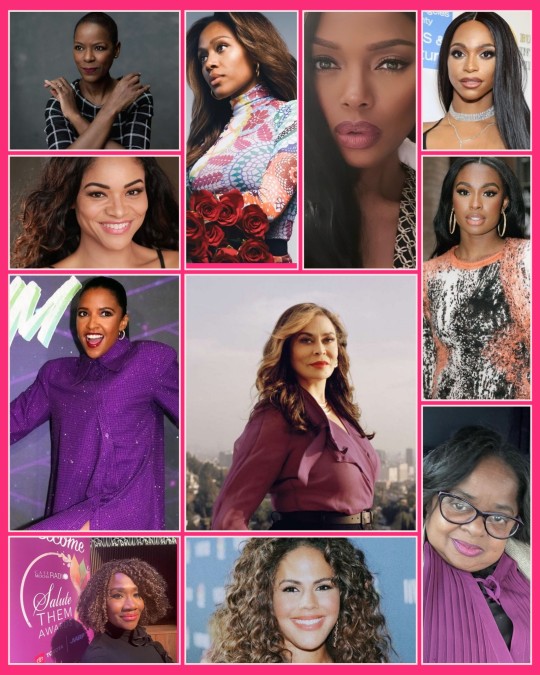
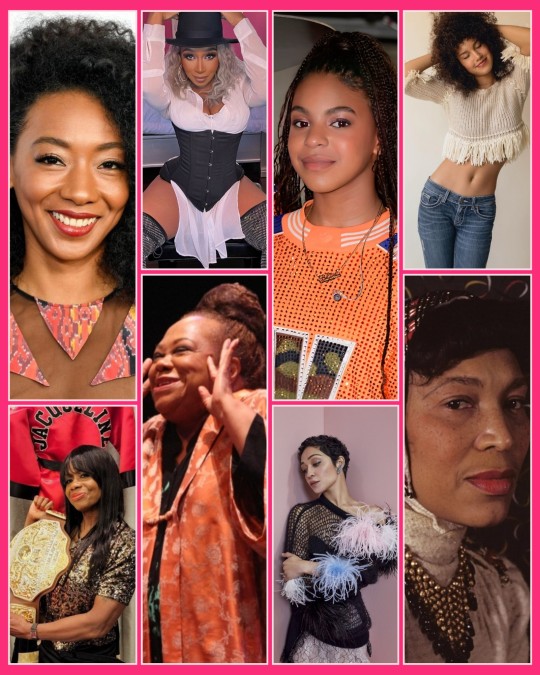
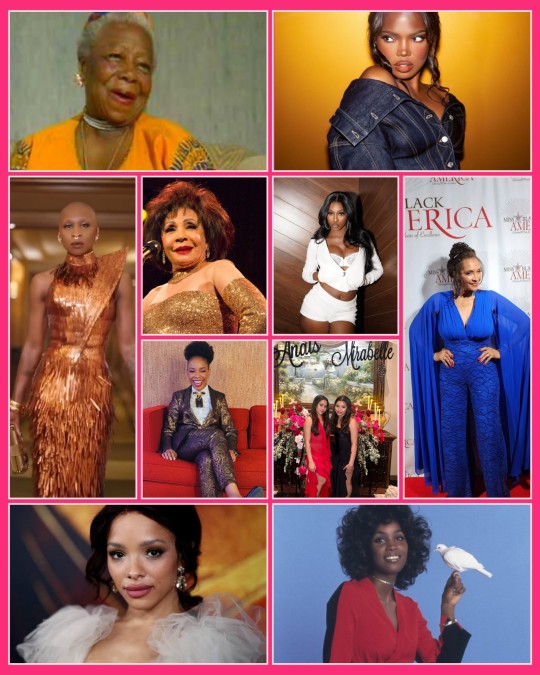
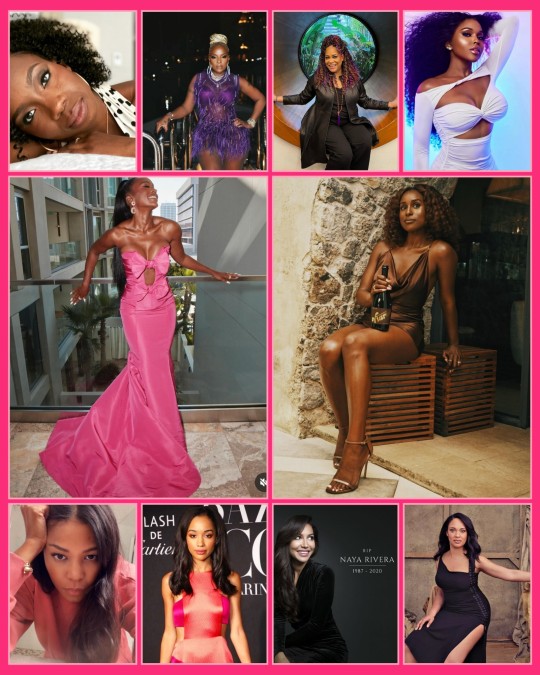
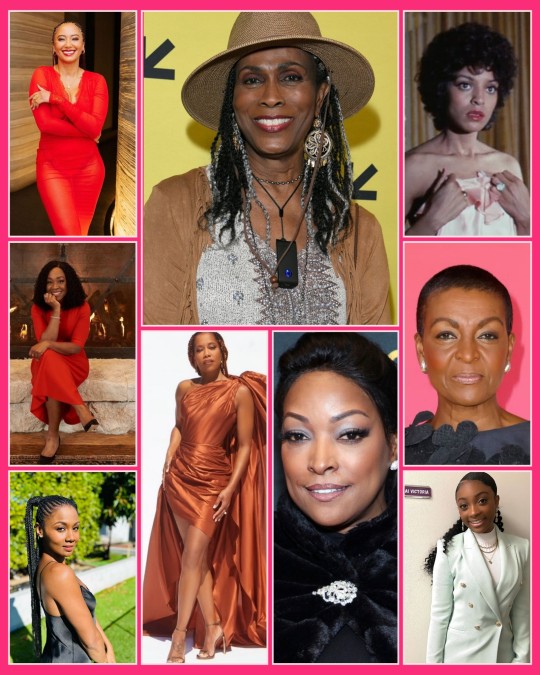
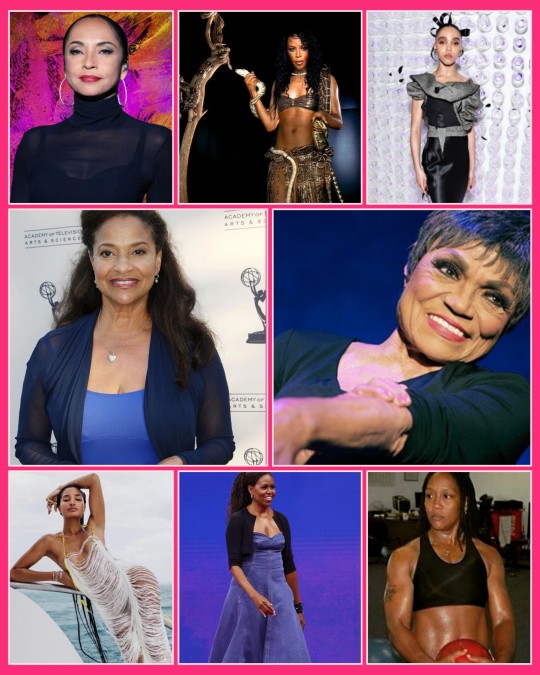
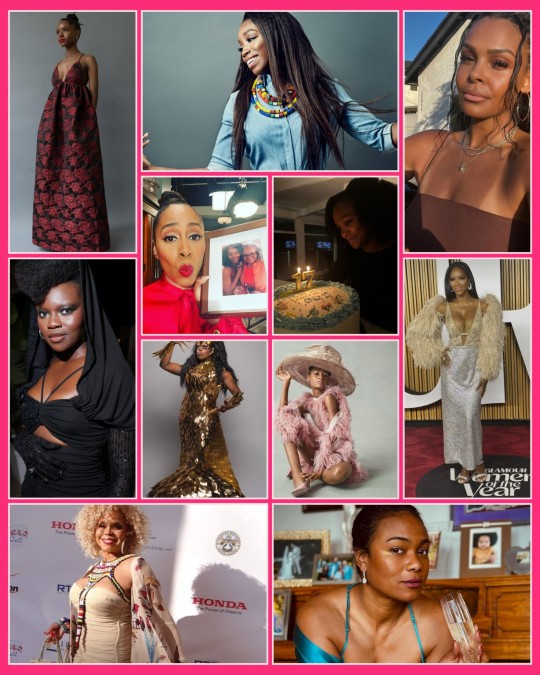
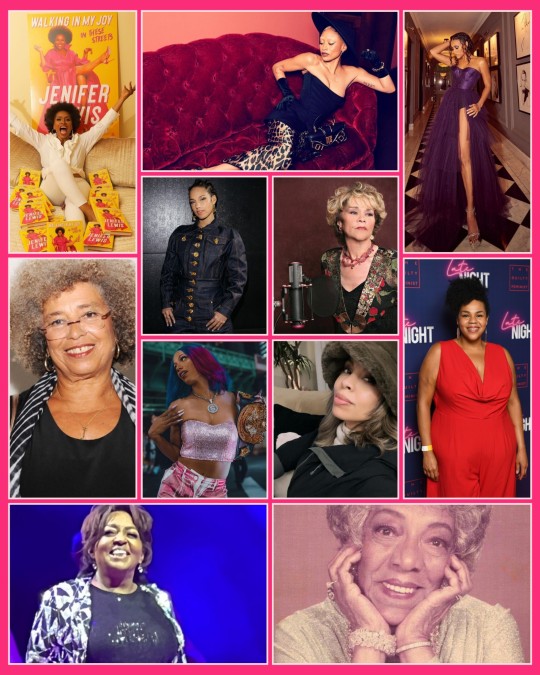
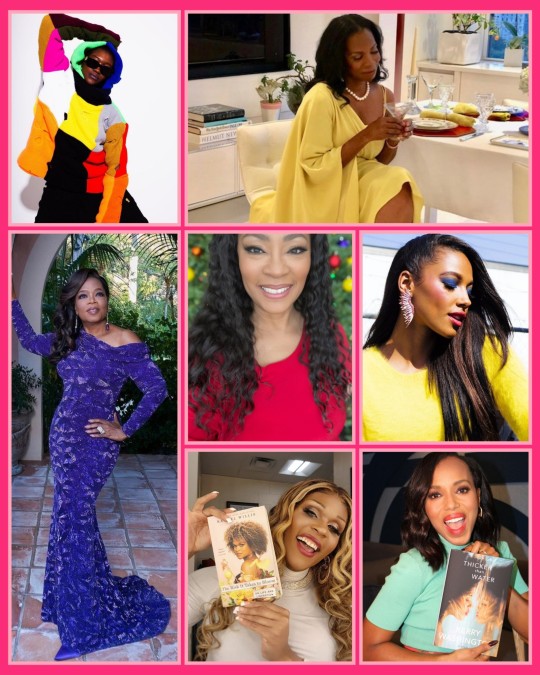
List will be updated as needed... I don't know everybody's birthday, and sometimes, the search engine don't either. I be using Google, and if something's wrong, it's wrong until I figure out the right date. Thank you.
Ones left off in 2024, when I made the list:
Vanity, Sindi Dlathu, Tanyell Waivers, Zaraah Abrahams, Zabryna Guevara, Quen Blackwell, Lanei Chapman, Willow Nightingale
#January#January Birthdays#celebrity birthdays#birthdays#Birthday Photosets#Nesha Photosets#Pink Aesthetic#Happy Birthday#Birthdays#January Calendar#January Capricorn#January Aquarius#Capricorn#Aquarius#Black Women in Entertainment#January 31#January Happy Birthday List#Happy Birthday List#black celebs#black actresses#black female singers#public figure
12 notes
·
View notes
Text
October 21st: 2010s Horror | Us
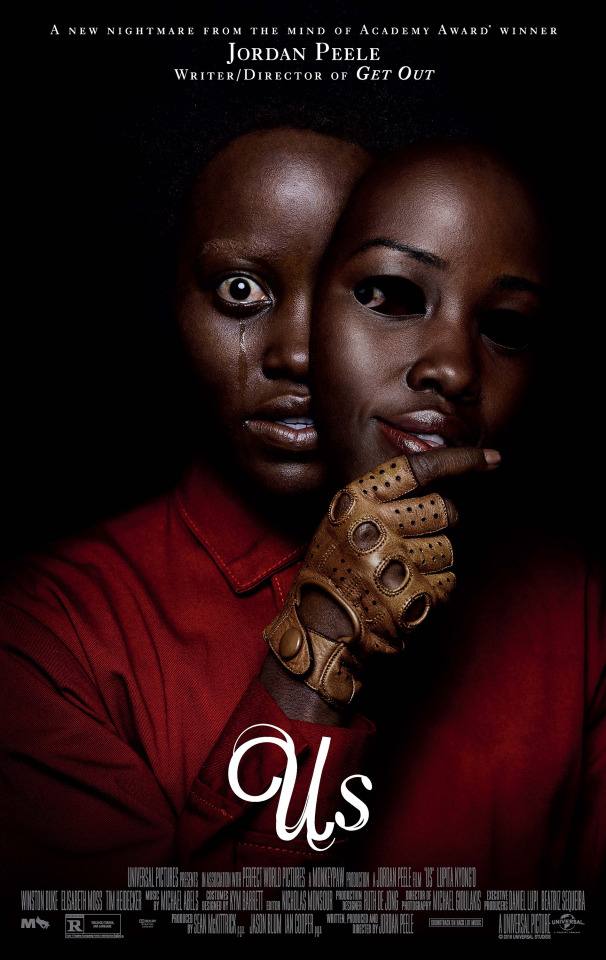
Us was released in 2019 and was directed by Jordan Peele. Adelaide Wilson (played by Lupita Nyong'o) returns to her childhood home at the beach with her husband Gabe (Winston Duke) and her children Zora (Shahadi Wright Joseph) and Jason (Jason Wilson). The family does their best to enjoy their time together on their vacation but Adelaide can't help the sinking feeling that something bad is going to happen due to some past trauma. Her fears turn out to be founded in truth as the family is attacked by four jumpsuited strangers: strangers that happen to look exactly like them.
This most recent decade, much like in the early 2000s, has expanded on pre-existing sub-genres and created some new titans in horror. Although remakes were still common, the new original films have stood out not only due to advancements in technology, but also the artistic expression and deep storytelling present in these movies. New directors to horror such as Ari Aster and Jordan Peele have started to become modern horror director legends thanks to their films such as Hereditary and Us respectively. Other films like It Follows, Cabin in the Woods, The Ritual, Get Out, and Ready or Not quickly gained notoriety due to the new and interesting twists and compelling stories they provided audiences, helping to revitalize interest in the horror genre and show that there is still more to the genre than just blood and violence.
I could not find any platforms where you can watch it for free.
Content Warnings for the Film (may contain spoilers): jumpsacres, violence, self-inflicted violence
#Today marks the end of the Horror by Decade and tomorrow we head into our final theme: Iconic Horror Directors#also Lupita Nyong'o is so fucking good in this movie holy shit#genuinely one of the best performances in this entire list#the movie is worth watching for just her acting alone#also since I don't have anything specific for 29-31 if anyone has any ideas please let me know#if I can't come up with anything special I will be doing some honorable mention films that didn't make it into the list#us 2019#meso's movies
6 notes
·
View notes
Text
Top 100 AO3 TV/Streaming Ships (Sept. 11, 2024)
(M/M) Castiel/Dean Winchester (Supernatural) 117,887 fics
(M/M) Derek Hale/Stiles Stilinski (Teen Wolf) 74,243 fics
(M/M) Sherlock Holmes/John Watson (Sherlock) 73,290 fics
(GQ/GQ) Aziraphale/Crowley (Good Omens) 67,782 fics
(M/M) Lan Zhan | Lan Wangji/Wei Ying | Wei Wuxian (Untamed) 4,3860 fics
(M/M) Dean Winchester/Sam Winchester (Supernatural) 35,140 fics
(M/M) Merlin/Arthur Pendragon (Merlin) 33,291 fics
(M/M) Magnus Bane/Alec Lightwood (Shadowhunters) 32,548 fics
(M/M) Will Graham/Hannibal Lector (Hannibal) 32,038 fics
(M/M) Evan "Buck" Buckley/Eddie Diaz (9-1-1) 29,793 fics
(M/M) Steve Harrington/Eddie Munson (Stranger Things) 29,253 fics
(M/M) Geralt of Rivia/Jaskier | Dandelion (The Witcher) 22,422 fics
(F/F) Kara Danvers/Lena Luthor (Supergirl) 21,811 fics
(M/M) James T. Kirk/Spock (Star Trek) 21,624 fics
(M&M) Sherlock Holmes & John Watson (Sherlock) 21,410 fics
(M/M) Blackbeard | Edward Teach/Stede Bonnet (Our Flag Means Death) 20,979 fics
(GQ&GQ) Aziraphale & Crowley (Good Omens) 19,432 fics
(M/M) Blaine Anderson/Kurt Hummel (Glee) 19,361 fics
(M/M) Ian Gallagher/Mickey Milkovich (Shameless) 17,057 fics
(M&M) Dean Winchester & Sam Winchester (Supernatural) 16,952 fics
(F/F) Evil Queen | Regina Mills/Emma Swan (Once Upon a Time) 16,419 fics
(F/M) Annabeth Chase/Percy Jackson (Percy Jackson and the Olympians) 15,474 fics
(M/M) Rodney Mckay/John Sheppard (Stargate Atlantis) 15,304 fics
(F/M) Fox Mulder/Dana Scully (The X-Files) 15,141 fics
(M/M) Gabriel/Sam Winchester (Supernatural) 15,036 fics
(F/M) Bellamy Blake/Clarke Griffin (The 100 TV) 14,940 fics
(M/M) Mycroft Holmes/Greg Lestrade (Sherlock) 13,760 fics
(F/F) Clarke Griffin/Lexa (The 100) 13,301 fics
(M/M) Jack Harkness/Ianto Jones (Torchwood) 13,265 fics
(M/M) Steve McGarrett/Dany "Dano" Willaims (Hawaii Five-0) 13,198 fics
(M&M) Castiel & Dean Winchester (Supernatural) 12,915 fics
(F/M) Oliver Queen/Felicity Smoak (Arrow) 12,729 fics
(M/M) Rorona Zora/Sanji (One Piece) 12,625 fics
(F/M) Tenth Doctor/Rose Tyler (Doctor Who) 12,538 fics
(F/M) Captain Hook | Killian Jones/Emma Swan (Once Upon a Time) 12,348 fics
(M/M) Peter Hale/Stiles Stilinski (Teen Wolf) 12,080 fics
(M/M) Will Byers/Mike Wheeler (Stranger Things) 11,861 fics
(M/M) Billy Hargrove/Steve Harrington (Stranger Things) 11,496 fics
(M/M) James "Bucky" Barnes/Sam Wilson (Falcon and Winter Soldier) 11,085 fics
(M/R) Dean Winchester/You (Supernatural) 10,773 fics
(F/M) Jaime Lannister/Brienne of Tarth (Game of Thrones) 10,252 fics
(F/M) Belle/Rumplestiltskin | Mr Gold (Once Upon a Time) 10,252 fics
(F/M) Sherlock Holmes/Molly Hooper (Sherlock) 9,702 fics
(M/M) James T. Kirk/Leonard "Bones" McCoy (Star Trek) 9,189 fics
(M/M) Jim Ellison/Blair Sandburg (The Sentinel) 9,123 fics
(F/M) Allison Argent/Scott McCall (Teen Wolf) 8,782 fics
(M/M) Patrick Brewer/David Rose (Schitt's Creek) 8,720 fics
(F/F) Robin Buckley/Nancy Wheeler (Stranger Things) 8,712 fics
(F/M) Jon Snow/Sansa Stark (Game of Thrones) 8,287 fics
(M/M) Clark Kent/Lex Luther (Smallville) 8,229 fics
(F/M) Leo Fitz/Jemma Simmons (Agents of SHIELD) 8,116 fics
(F/M) Chloe Decker/Lucifer Morningstar (Lucifer) 8,035 fics
(F&M) Robin Buckley & Steve Harrington (Stranger Things) 7,934 fics
(M/M) Carlos Reyes/TK Strand (9-1-1 Lonestar) 7,809 fics
(F/M Katara/Zuko (Avatar Last Airbender) 7,754 fics
(F/M) Olivia Benson/Elliot Stabler (Law & Order SVU) 7,409 fics
(M/M) Jiang Cheng | Jiang Wanyin/Lan Huan | Lan Xichen (Untamed) 7,343 fics
(F/M) Tim Bradford/Lucy Chen (The Rookie) 7,213 fics
(M&M) Merlin & Arthur Pendragon (Merlin) 7,166 fics
(F/M) Sokka/Zuko (Avatar Last Airbender) 7,137 fics
(M/M) Brian Kinney/Justin Taylor (Queer as Folk) 7,092 fics
(F/M) Spike/Buffy Summers (Buffy the Vampire Slayer) 6,847 fics
(M/M) Nicholas "Nick" Nelson/Charles "Charlie" Sprig (Heartstopper) 6,786 fics
(F/F) Wednesday Addams/Enid Sinclair (Wednesday) 6,749 fics
(F/M) Sam Carter/Jack O'Neill (Stargate SG-1) 6,718 fics
(F/M) Jessica Moore/Sam Winchester (Supernatural) 6,559 fics
(F/F) Alex Danvers/Maggie Sawyer (Supergirl) 6,537 fics
(M/M) Daniel Jackson/Jack O'Neill (Stargate SG-1) 6,532 fics
(M/M) Liam Dunbar/Theo Racken (Teen Wolf) 6,465 fics
(M/M) Ayanya/Zheng Yunling (Super-Vocal) 6,455 fics
(F/M) Betty Cooper/Jughead Jones (Riverdale) 6,434 fics
(M/M) Julian Bashir/Elim Garak (Star Trek Deep Space Nine) 6,433 fics
(M/M) Aaron Dingle/Robert Sugden (Emmerdale) 6,419 fics
(F/M) Chakotay/Kathryn Janeway (Star Trek Voyager) 6,415 fics
(F/M) Mary Morstan/John Watson (Sherlock) 6,278 fics
(F/M) Gendry/Arya Stark (Game of Thrones) 6,185 fics
(F/F) Waverley Earp/Nicole Haught (Wynonna Earp) 6,167 fics
(F/M) Eleven | Jane Hopper/Mike Wheeler (Stranger Things) 6,160 fics
(M/M) Wen Kexing/Zhou Zishu (Word of Honor) 6,108 fics
(F/M) The Darkling | Aleksander Morozova/Alina Starkov (Shadow and Bone) 6,082 fics
(M/M) Benton Fraser/Roy Kowalski (due South) 5,911 fics
(F/M) Daemon Targaryen/Rhaenyra Targaryen (House of the Dragon) 5,882 fics
(F/M) Wanda Maximoff/Vision (WandaVision) 5,861 fics
(M/M) Oswald Cobblepot/Edward Nygma (Gotham) 5,862 fics
(M&M) Will Graham & Hannibal Lector (Hannibal) 5,841 fics
(F/M) Colin Bridgerton/Penelope Featherington (Bridgerton) 5,814 fics
(F/M) Jon Snow/Daenerys Targaryen (Game of Thrones) 5,804 fics
(M/M) Shen Wei/Zhao Yunlan (Guardian) 5,709 fics
(M/R) Sam Winchester/You (Supernatural) 5,631 fics
(M/M) Castiel/Sam Winchester (Supernatural) 5,586 fics
(M/M) Evan Bech Naesheim/Isak Valterson (SKAM-Norway) 5,422 fics
(F/M) Kaz Brekker/Inej Ghafa (Shadow and Bone) 5,394 fics
(M/M) Loki/Mobius M. Mobius (Loki) 5,321 fics
(M/M) Dream of the Endless/Hob Gadling (The Sandman) 5,309 fics
(F/M) Dean Winchester/Original Female Character (Supernatural) 5,289 fics
(F/M) Selina Kyle/Bruce Wayne (Gotham) 5,230 fics
(F/M) Barry Allen/Iris West (The Flash) 5,175 fics
(F/M) Vernon Boyd/Erica Reyes (Teen Wolf) 5,127 fics
(M/M) Michael Guerin/Alex Manes (Roswell New Mexico) 5,070 fics
(M/R) Eddie Munson/You (Stranger Things) 5,050 fics
#AO3 Statistics#Shipping Stats#Fandom data compilation#Fanwork research#Television#Streaming service
5 notes
·
View notes
Text
List of all the books I’ve read
just wanted to keep a list of what I’ve read throughout my life (that I can remember)
Fiction:
“Where the Red Fern Grows,” Wilson Rawls
“The Outsiders,” S. E. Hinton
“The Weirdo,” Theodore Taylor
“The Devil’s Arithmetic,” Jane Yolen
“Julie of the Wolves series,” Jean Craighead George
“Soft Rain,” Cornelia Cornelissen
“Island of the Blue Dolphins,” Scott O’Dell
“The Twilight series,” Stephanie Mayer
“To Kill a Mockingbird,” Harper Lee
“Gamer Girl,” Mari Mancusi
“Redwall / Mossflower / Mattimeo / Mariel of Redwall,” Brian Jacques
“1984,” and “Animal Farm,” George Orwell
“Killing Mr. Griffin,” Lois Duncan
“Huckleberry Finn,” Mark Twain
“Rainbow’s End,” Irene Hannon
“Cold Mountain,” Charles Frazier
“Between Shades of Gray,” Ruta Sepetys
“Great Short Works of Edgar Allan Poe,” Edgar Allan Poe
“Lord of the Flies,” William Golding
“The Great Gatsby,” F Scott Fitzgerald
“The Harry Potter series,” JK Rowling
“The Fault in Our Stars,” “Looking for Alaska,” and “Paper Towns,” John Green
“Thirteen Reasons Why,” Jay Asher
“The Hunger Games series,” Suzanne Collins
“The Perks of Being a Wallflower,” Stephen Chbosky
“Fifty Shades of Grey,” EL James
“Speak,” and “Wintergirls,” Laurie Halse Anderson
“The Handmaid’s Tale,” Margaret Atwood
“Mama Day,” Gloria Naylor
“Jane Eyre,” Charlotte Bronte
“Wide Sargasso Sea,” Jean Rhys
“The Haunting of Hill House,” Shirley Jackson
“The Chosen,” Chaim Potok
“Leaves of Grass,” Walt Whitman
“Till We Have Faces,” CS Lewis
“One Foot in Eden,” Ron Rash
“Jim the Boy,” Tony Earley
“The Vanishing Act of Esme Lennox,” Maggie O’Farrell
“A Land More Kind Than Home,” Wiley Cash
“A Parchment of Leaves,” Silas House
“Beowulf,” Seamus Heaney
“The Silence of the Lambs / Red Dragon / Hannibal / Hannibal Rinsing,” Thomas Harris
“Cry the Beloved Country,” Alan Paton
“Moby Dick,” Herman Melville
“The Hobbit / The Lord of the Rings trilogy / The Silmarillion,” JRR Tolkien
“Beren and Luthien,” JRR Tolkien, edited by Christopher Tolkien
“Children of Blood and Bone / Children of Virtue and Vengeance,” Tomi Adeyemi
“Soundless,” Richelle Mead
“The Life She Was Given,” Ellen Marie Wiseman
“The Girl with the Louding Voice,” Abi Dare
“A Song of Ice and Fire series / Fire and Blood,” GRR Martin
“A Separate Peace,” John Knowles
“The Bluest Eye,” and “Beloved,” Toni Morrison
“Brave New World,” Aldous Huxley
“The Giver / Gathering Blue / Messenger / Son,” Lois Lowry
“The Ivory Carver trilogy,” Sue Harrison
“The Grapes of Wrath,” and “Of Mice and Men,” John Steinbeck
“The God of Small Things,” Arundhati Roy
“Fahrenheit 451,” Ray Bradbury
“The Night Circus,” Erin Morgenstern
“Sunflower Dog,” Kevin Winchester
“A Tree Grows in Brooklyn,” Betty Smith
“The Catcher in the Rye,” JD Salinger
“The Absolutely True Diary of a Part-Time Indian,” Sherman Alexie
“Bridge to Terabithia,” Katherine Paterson
“The Good Girl,” Mary Kubica
“The Last Unicorn,” Peter S Beagle
“Slaughterhouse Five,” Kurt Vonnegut Jr
“The Joy Luck Club,” Amy Tan
“The Sworn Virgin,” Kristopher Dukes
“The Color Purple,” Alice Walker
“Their Eyes Were Watching God,” Zora Neale Hurston
“The Light Between Oceans,” ML Stedman
“Yellowface,” RF Kuang
“A Flicker in the Dark,” Stacy Willingham
“One Piece Novel: Ace’s Story,” Sho Hinata
“Black Beauty,” Anna Seawell
“The Weight of Blood,” Tiffany D. Jackson
“Mulberry and Peach: Two Women of China,” Hualing Nieh, Sau-ling Wong
“The Weight of Blood,” Laura McHugh
“Everybody’s Got to Eat,” Kevin Winchester
“That Was Then, This is Now,” / “Rumble Fish,” / “Tex,” / “Taming the Star Runner,” S. E. Hinton
“Beneath the Moon: Fairy Tales, Myths, and Divine Stories from Around the World,” Yoshi Yoshitani
“Memoirs of a Geisha,” Arthur Golden
“The Best Awful,” Carrie Fisher
Non-fiction:
“Anne Frank: Diary of a Young Girl,” Anne Frank
“Night,” Elie Wiesel
“Invisible Sisters,” Jessica Handler
“I Am Malala: The Story of the Girl Who Stood Up for Education and was Shot by the Taliban,” Malala Yousafzai
“The Interesting Narrative,” Olaudah Equiano
“The Immortal Life of Henrietta Lacks,” Rebecca Skloot
“Incidents in the Life of a Slave Girl,” Harriet Jacobs
“The Princess Diarist,” Carrie Fisher
“Adulting: How to Become a Grown Up in 468 Easy(ish) Steps,” Kelly Williams Brown
“How to Win Friends and Influence People,” Dale Carnegie
“Carrie Fisher: a Life on the Edge,” Sheila Weller
“Make ‘Em Laugh,” Debbie Reynolds and Dorian Hannaway
“How to be an Anti-Racist,” Ibram X Kendi
“Maus,” Art Spiegelman
“I Know Why the Caged Bird Sings,” Maya Angelou
“Wise Gals: the Spies Who Built the CIA and Changed the Future of Espionage,” Nathalia Holt
“Persepolis,” and “Persepolis II,” Marjane Satrapi
“How to Write a Novel,” Manuel Komroff
“The Nazi Genocide of the Roma,” Anton Weiss-Wendt
“Children of the Flames: Dr. Josef Mengele and the Untold Story of the Twins of Auschwitz,” Lucette Matalon Lagnado and Sheila Cohn Dekel
“Two Watches,” Anita Tarlton
“The Ages of the Justice League: Essays on America’s Greatest Superheroes in Changing Times,” edited by Joseph J. Darowski
“Shockaholic,” Carrie Fisher
“Breaking Loose Together: the Regulator Rebellion in Pr-Revolutionary North Carolina,” Marjoleine Kars
#books#some of these I read for school assignments and some I read of my own volition#some I read when I was a young teenager many years ago and some I read just this past month#somewhat in order of which I read them#some of these I have read more than once#for the record I work at a library which is how I'm able to access so many books#support your local library#also just because I read these books doesn't necessarily mean that I would recommend all of them to just anyone#don't come at me for reading 'problematic' books please#I was an english major in college and didn't get to choose a lot of what I read#but even the ones I was forced to read I'm glad that I read them#I don't really regret reading any of these; even the one's that I didn't like#I will add to the list whenever I finish a book#annemariereads
8 notes
·
View notes
Text
Us (2019)

As audiences become increasingly concerned with details rather than the artistry and emotional impact of stories, I wonder how Us will fare in the long run. When everything is laid out on the table, there’s a bunch of stuff here that doesn’t make a whole lot of sense but you’d be wrong to dismiss a sci-fi horror film for not adhering to the rules or reality. Instead, focus on the ideas within, the tension it generates and the excellent performances.
Years ago, Adelaide (Lupita Nyong’o) encountered a doppelgänger of herself in a funhouse hall of mirrors. In present-day, she and her family - husband Gabe (Winston Duke), daughter Zora (Shahadi Wright) and son Jason (Evan Alex) - return to the same beach and are attacked by the same woman. This time, “Red” (also played by Nyong'o) is accompanied by doubles of the entire family. They think like their counterparts and are determined to shed blood.
This is a frightening film but the chills you get come from just how… strange of a scenario this is. The Wilson family duplicates are deranged parodies with a dark twist. Gabe is a bit of a weenie; when he tries to intimidate the intruders from a distance, you can tell he doesn’t even believe in his own ability to frighten. By contrast, “Abraham” is a hulking, silent brute. Jason’s duplicate is the hideously burned and animal-like "Pluto", a vision of what might’ve happened to the boy if he managed to get that lighter he keeps playing with working. The most striking of the “Tethered” by far is Red, who is so unsettling, so like Adelaide but so unlike her, you hardly believe they’re played by the same actress. When the Tethered and their eerie appearances are combined with the home invasion-like plot, it gets scary. Their uniforms - a red jumpsuit combined with a single glove on the right hand - and the weapons they wield - pairs of scissors - combined with the numbers and visual motifs that keep popping up make it seem as though a gate to some other realm has been opened, or a prophecy fulfilled. Even before they show up, you feel something ominous coming.
Writer/director Jordan Peele once again shows an awareness uncommon in horror filmmakers. His characters are smart and resourceful. When under attack, they grab weapons, they band together, they work to ensure their survival. You like them. You want the family to survive. The mystery of what exactly is happening is made further engaging by the filmmaking. Some jaw-droppingly stylish sequences make great use of music, particularly towards the end. There's also just a bit of humor mixed in to break the tension when necessary.

The first time I saw Us, I couldn’t put my finger on what it all meant. Clearly, Peele wants to say something… but what? This time, I think I’ve got it. Even before reading his explanation, I saw the film as a commentary on class and circumstances. Red and Adelaide are essentially the same person. It just happens that one was born along with the Tethered, where there are no opportunities. These people survive on the bare minimum, while those above live in comparative luxury. Then, there’s more. See, it’s revealed (in a twist that’s not all that hard to decipher) that years ago, Red and Adelaide switched places. It proves the Tethered could be “rehabilitated” and live normal lives. There is room for everyone to be happy… except no one even considers it an option. When the real Adelaide comes back to the surface, it isn’t to tell the world what her adopted people have been suffering through; it’s to kill. You could see this as a sign that our way of living needs to be smashed - at the end of the film, the Tethered are seen “ruling the world” in harmony. Then again, at what cost was this victory? When Jason uses his influence upon his duplicate to burn him to death, everyone is distraught, and that’s to say nothing of all the other people who died. There’s a lot to read in there, so does it matter that the hows and whys of an entire country’s population living underground after a failed experiment raises a lot of questions? Not in the grand scheme of things.

Us is a strange film. Its meaning is hard to decipher at first. Even when all the cards are laid out, you could easily get lost in the mechanics of its scenario. What matters is what the film does well, which is a lot. The performances are chilling, the visuals striking and as a whole, the picture is unforgettable. The tension is like two hands gripped around your throat, which gives it a lot of re-watch value. (October 15, 2021)

#Us#movies#films#movie reviews#film reviews#Jordan Peele#Lupita Nyong'o#Winston DUke#Elisabeth Moss#Tim Heidecker#2019 movies#2019 films#Shahadi Wright Joseph#Evan Alex
2 notes
·
View notes
Text
Tagged by @bawnjourno thank u :3
last song:
As i type this i am actively listening to Ain't No Rest for the Wicked Cage the Elephant
favorite color:
Green :-)
currently watching:
Houusee MD 🦧 (that's wilson)
last movie:
STALKER 1979, showed my pal :3
currently reading:
Barracoon: The Story of the Last "Black Cargo" - Zora Neale Hurston
sweet/spicy/savoury:
Savoury👍
relationship status:
Single and ready to settle 🤰🧑��🍼😊🙌
current obsession:
Looking at every single individual moment in life from a cultural anth point of view and then exploding :(
last thing i googled:
"Can praying mantis hurt me" cause of this guy

currently working on:
My got-damn site reporrrtt 😭😭😭😭
5 notes
·
View notes
Text
star trek: short treks
they are treks that are short
so they're gonna get this one post and since it's only 10ish episodes total i'll comment on each one LET'S GO
season 1
ep 1 the runaway: it's fine it's cute tilly makes a space friend and we get to see what tilly's mom is like in person (technically) and she's kind of a bitch. we always heard about tilly's mom but it's nice to have a show don't tell example as well
ep 2 calypso: whelp this puts the discovery series finale in a different perspective but what the fuck ever man letting zora get more screen time as a sentient ship is still nice. and anything with aldis hodge is already a+++
ep 3 the brightest star: more of what saru's life was like before he joined starfleet and how he managed to get off his world. no such thing as too much doug jones or michelle yeoh
ep 4 the escape artist: scumbag harry mudd/rainn wilson gets more screentime as we see just how many times he's had to squirm out of a situation over the years...plus an ending that references his 2nd appearance on ToS. enjoyable and the bit of brevity needed now and again
season 2
ep 1 q&a: oh fuck yeah spock's first day on the enterprise as a baby science ensign AND gets stuck in an elevator with the ship's #1 so it's question/exposition time. delightful
ep 2 the trouble with edward: oh shit h jon benjamin as like...ToS-version of barclay oh fuck yeah baybee AND he's the one that fucks up the tribbles to the rapidly multiplying little fuckers we know and love to this day. no notes, you have my heart, there is literally nothing else you could've made in this mini series to make me know love exists as much as this episode has a+++++++++
ep 3 ask not: ooooo pike is a prisoner and this cadet has to show that she knows what's the deal when it comes to serving in starfleet, a goodie. a++
ep 4 ephraim and dot: a tardigrade's hijinks through ToS episodes as it tries to safely lay its eggs despite a robot getting in its way. also space lincoln makes an appearance and for that i am ever grateful
ep 5 the girl who made the stars: cute bedtime story/fairytale about the stars and conquering fears. a++
ep 6 children of mars: gonna assume this has stuff to do with the picard show but dang how easily a day/a life can be ruined, especially when it comes to interplanatary conflicts, huh?
kinda like the idea behind this whole series really, short stories taking place in the trek universe that work better because they're not needlessly stretched out to fill a time slot. kinda like the 80s twilight zone series, i know at least 2 of my fave episodes from that series were both like 15 minutes or less
if you can't guess which was my favorite episode of this series, then i don't know how to help you
taking the rest of the night to watch random youtube vids as a palate cleanser before i start on picard
1 note
·
View note
Text
Class and Privilege in Jordan Peele’s ‘US’


Honestly, when I first watched this movie, I didn't get it. Like at all. Buuut after uncovering the many many layers of its symbolism in class, I struggled to pick what I should even talk about in this post. After taking the time to really listen to each character’s words, and reflect on a lot of the directing decisions evident in how the Wilson family interact with the ‘tethered’, I found that the discourse surrounding class and privilege was staggeringly obvious, and I just didn’t see it right in front of me. Which, I suppose, is true for a lot of people that are lucky enough to lead very privileged lives outside of the cinema - and honestly, is personally a bit embarrassing for me that I didn’t realise this movie motif sooner.

A key theme that almost went completely over my head in the first viewing of ‘US’ was privilege, which is illustrated by Winston Duke’s character ‘Gabe’ trying to make sure the family ‘keeps up’ with the typical suburban middle class lifestyle that is often associated with the domestic ‘American Dream’. For example, taking a beach holiday in Santa Cruz, buying a boat and staying in a neighbourhood that is predominantly made up of white people (or as far as the film shows us).

Zora and her mother look and appear to feel a little out of place on the beach; Zora doesn’t want to go into the water (maybe because she doesn’t want to get her hair wet, but its never specified), which the twins find weird, and Adelaide doesn’t want to relax and tan and drink on the deckchair in the same way that the white mother does - which makes the whole scene quite uncomfortable to watch - so I could really empathise with that uncomfortable feeling of being just a little bit out of place in this white-normative world.
Subtle insinuations that Gabe wants to be on par with his ‘peers’ (the white family in the film) are made through the dialogue in the beginning scenes of the film. Gabe even comments on how Josh just ‘had to’ get that new car, and repeats ‘it’s not about the size of the boat’ and ‘it’s not a contest’ just often enough to generate that feeling of unease and discomfort among other characters. If there’s anything I’ve learned about Jordan Peele films, it’s that nothing is by accident.

Although this film isn’t explicitly about race in the way that ‘GET OUT’ is, we have to acknowledge that the black family at the centre of this film is probably one of relatively few other black families that share their income level.
Whenever someone is in a position of power, there’s always that underlying question of who they had to overtake to get there - which embodies the dichotomy of the ‘American Dream’, which is built on the notion that anyone can ‘make it’ in the United States with sincere, hard work - which is not the case, if institutional racism has anything to do with it.

The ‘tethered’s’ mission is very much based on a ‘dog eat dog’ mindset, and Red even says “it’s our time now”, as the film later cuts to a news channel reporting hundreds of families killed and overtaken by their doppelganger counterparts. When Gabe asks “Who are you people?”, Red responds by saying “We’re Americans” - and that really struck me.
In this film, it feels like Jordan Peele is trying to destabilise and disrupt conventional meanings of what it means to be ‘American’, and actually allude to how American, like many countries, has acquired their wealth through the dispossession, exploitation and oppression of indigenous people, African Americans and other minority groups.

This notion was strengthened by the likening of the tethered outfits to prison jumpsuits in class, a point made by Professor Due, which got me thinking about the horrifying reality of mass incarceration in America, which can almost be seen as a kind of sick, twisted industry that generates free prison labour, profits private prison companies and maintains long standing racial inequalities across the US. OH WAIT - I JUST HAD A REVELATION (obviously probably not the first person to make this connection but whatever) - ‘US’ also stands for ‘United States’ - which makes a lot of sense if I’m running with the idea that this film is really a socio-political discourse on privilege and oppression in modern-day America.

Finally, a little more from me and my personal experiences. Although I don’t like to think about it as much as I should, everything, and I mean EVERYTHING I am and I have today is due to the hard work and sacrifices of my ancestors. From the endless bloodshed and torture my people endured during the fight for Indepedence from British Colonisation in India (which was achieved in 1947 - less than 100 years ago!) to the sleepless nights and workplace discrimination my parents faced as junior doctors that moved to the UK to give their little girl a better quality of life. In fact, I’m going to go call them and tell them how grateful I am right now.
Thank you for reading!
Until next time,
Vedika
0 notes
Text
My 2023 Reading Stats
My goal was to read 12 books. I read 45 total!
I read mostly authors I'd never read before. I made a significant dent in my purchased TBR. I read 5 classics. I read 7 genres.
I checked out 3 books from my local library.
I did not finish 3 books. Les Liaisons Dangereuses, Lolita by Vladimir Nabokov, and Anna Karenina by Leo Tolstoy.
Reasons: LLD the two main characters were getting on my fucking nerves so bad. Valmont leave that woman ALONE! Also, the epistolary style does not make for active reading.
Lolita. I mean, take a wild guess.
AK. To many characters with the same name, I also signed up for one thing, but it's about a whole bunch of things.
I read the longest book I've ever read, Gone with the Wind. I thought it would take a year. Surprisingly, it took a month. December 22nd to January 22nd. I took four days off because the racism was getting on my nerves. I also sometimes just missed a day or two.
January
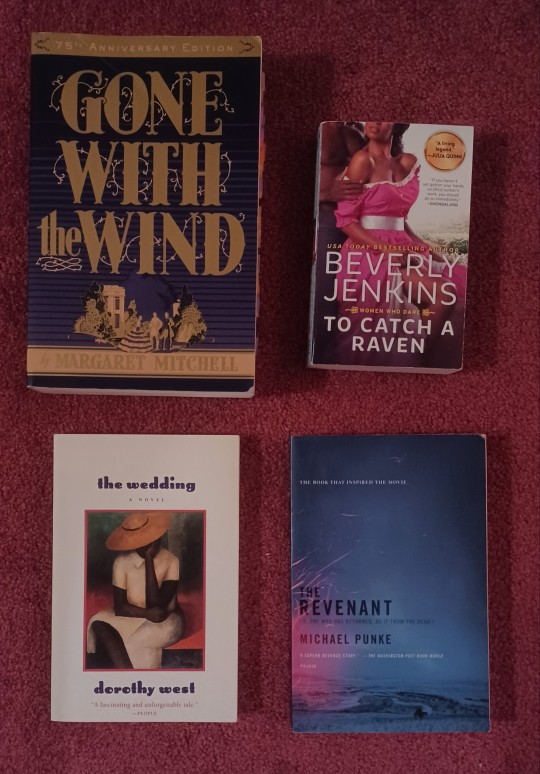
Loved: To Catch a Raven by Beverly Jenkins, The Wedding by Dorothy West, The Revenant by Michael Punke.
I refuse to say I loved this book, but I did enjoy reading it, a lot: Gone with the Wind by Margaret Mitchell
February
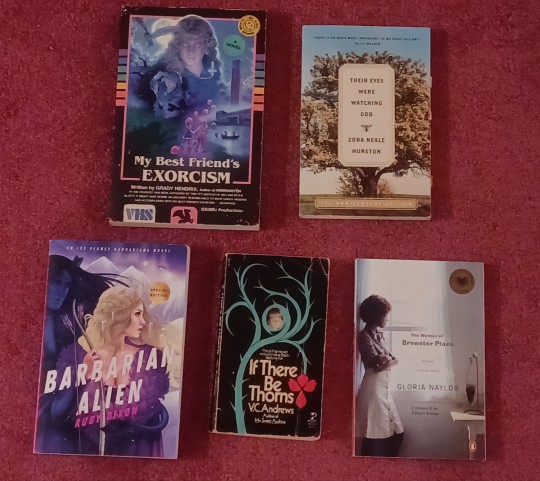
Loved: Their Eyes were Watching God by Zora Neale Hurston, The Women of Brewster Place by Gloria Naylor, If There be Thorns by VC Andrews, Barbarian Alien by Ruby Dixon.
Read: My Best Friend's Exorcism by Gravy Hendrix
March
Loved: Priest by Sierra Simone, Roses are Red by James Patterson
Read depressingly: The Stranger by Albert Camus
April

Loved: A Hero Ain't Nothin' but a Sandwich by Alice Childress, Moby Dick by Herman Melville. Big Bad Wolf by James Patterson
Read: In the Woods by Tana French
May
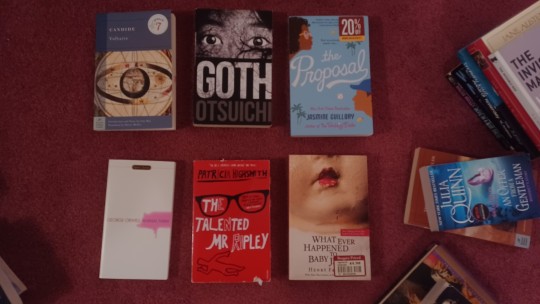
Loved: Whatever Happened to Baby Jane by Henry Farrell
Liked: Animal Farm by George Orwell, Candice by Voltaire
Read: The Proposal by Jasmine Guillory, The Talented Mr. Ripley by Patricia Highsmith
Hated: GOTH by Otsuichi. It was like reading an edgelords Wattpad writing.
This month was so Meh. Baby Jane came in at the end and saved it.
June
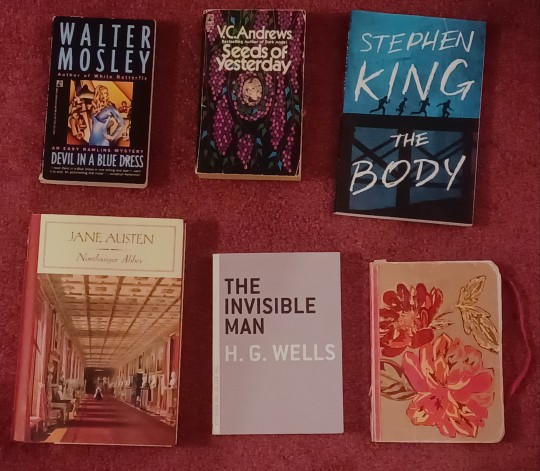
Loved: The Invisible Man by HG Wells, Seeds of Yesterday by VC Andrews
Liked: Northanger Abbey by Jane Austen, Devil in a Blue Dress by Walter Mosley, Violets are Blue by James Patterson
Read: The Body by Stephen King.
I have one Flowers in the Attic book left in looking into the other VC Andrews books, but none of them are calling me like Flowers. Maybe I'll read the one with the twins.
July
Loved: The War of the World's by H.G. Wells, An Offer from a Gentleman by Julia Quinn, London Bridges by James Patterson
August
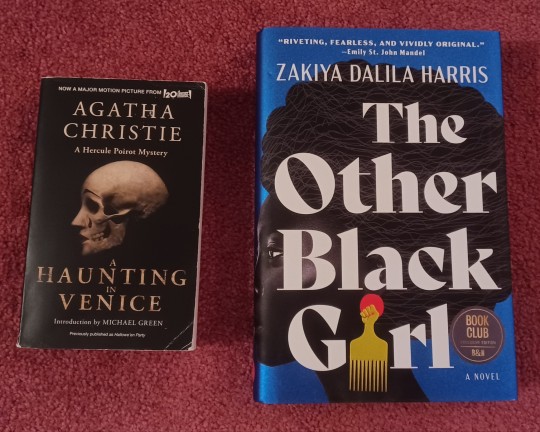
Read: The Hallowe'en Party or A Haunting in Venice by Agatha Christie
Hated: The Other Black Girl by Zakiya Dalila Harris
September
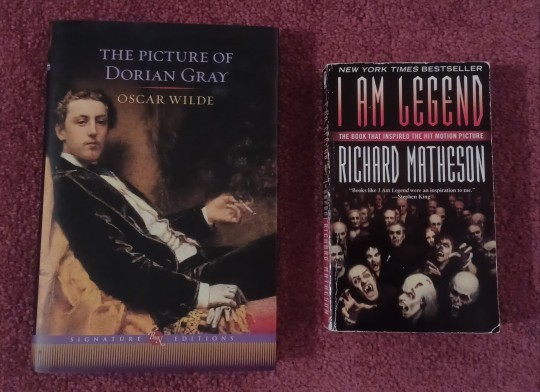
Loved: I am Legend by Richard Matheson
Liked: The Picture of Dorian Gray by Oscar Wilde
October
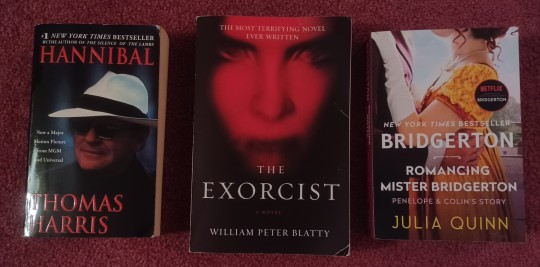
Loved: Hannibal by Thomas Harris, Romancing Mister Bridgerton by Julia Quinn
Read: The Exorcist by William Peter Blatty
I have one Hannibal book left. What am I supposed to do for Halloween 2025?
November
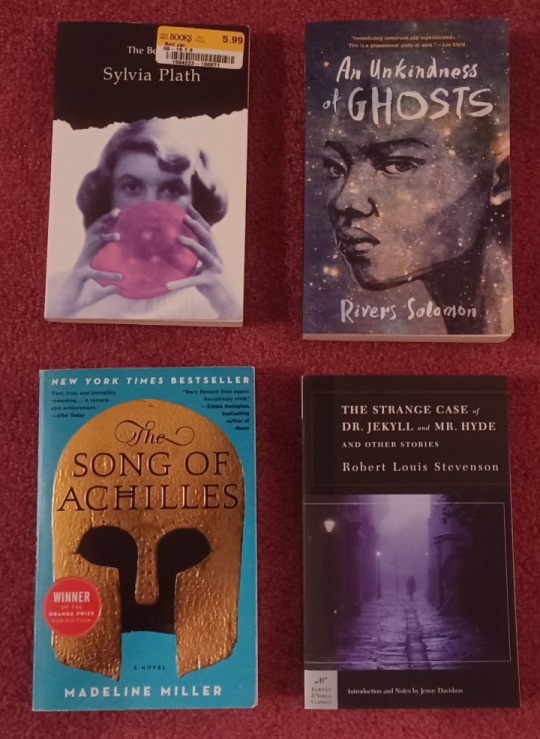
Loved: An Unkindness of Ghosts by Rivers Solomon and The Song of Achilles by McAllen l Madeline Miller
Liked: The Bell Jar by Sylvia Plath, The Strange Case of Dr. Jekyll and Mr. Hyde by Robert Louis Stevenson
December
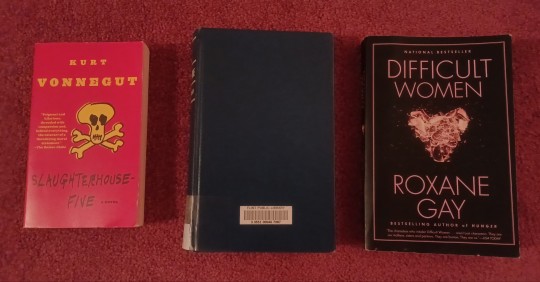
Loved: Difficult Women by Roxane Gay
Liked: Slaughterhouse-Five by Kurt Vonnegut
Read: Marnie by Winston Graham.
The book I was looking forward to the most. It's one of my favorite movies. It was the book I just wanted to end. Also, I keep calling this author every name but his own. Winston Granton, William Granston, Graham Wilson.
#reading stats#reading journal#books and libraries#library books#reading#tbr list#to be read#did not finish
1 note
·
View note
Text
Black Femme Character Dependency Dark Skin Directory: Z
Z: The Characters:
Zakia Asalache | Zaria Peterson | Zelie Adebola | Zephyr Halima | Zoe Head Count | Zoe Washburne | Zoey Super Monsters | Zoey Baker | Zola Grey Shepherd | Zora Wilson | Zula | Zula Hendricks | Zuri Ross

Z: The Entertainers
Zainab Johnson | Zelda Harris | Zenobia | Zethu Dlomo | Zhariah Hubbard | Ziwe Fumudoh | Zola Williams | Zozibini Tunzi

#BFCD DS Directory#Z#BFCD Dark Skin December#BFCD Dark Skin December 2023#DSD: Z#Girl That's Queuedt
7 notes
·
View notes